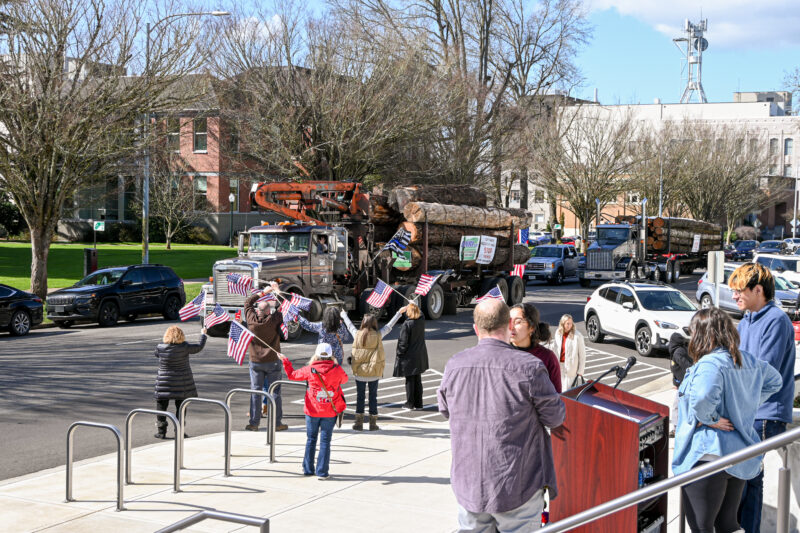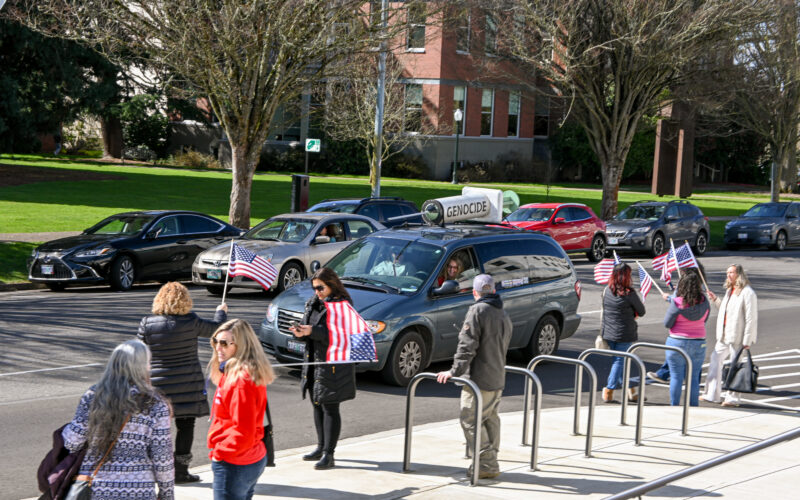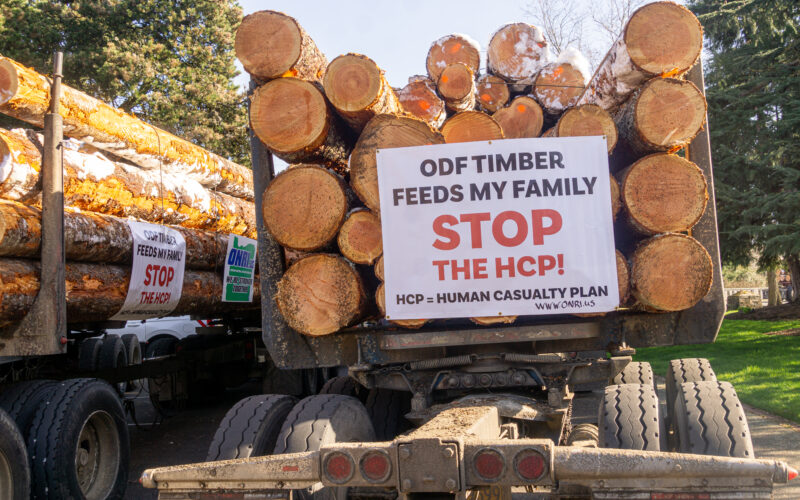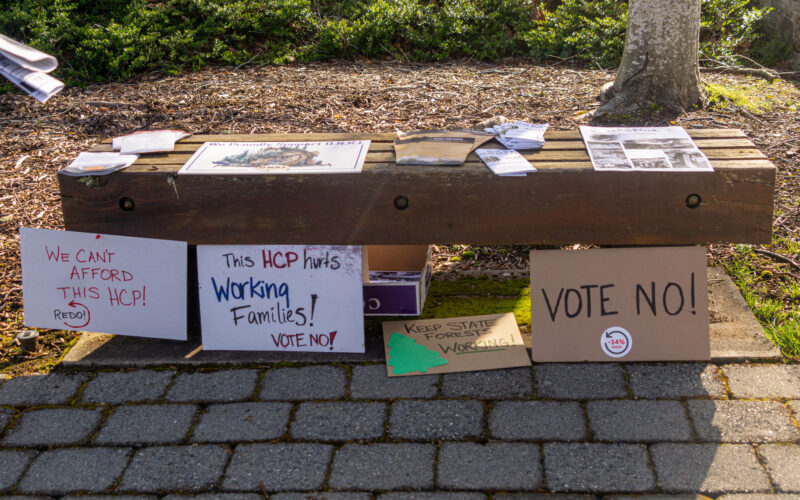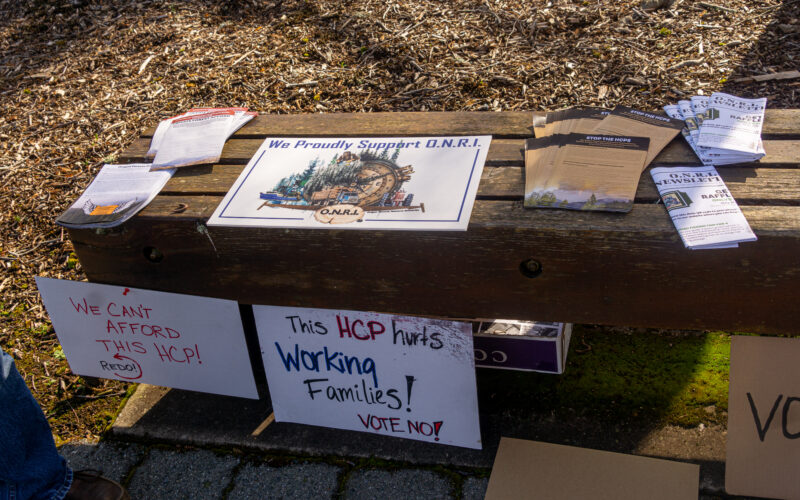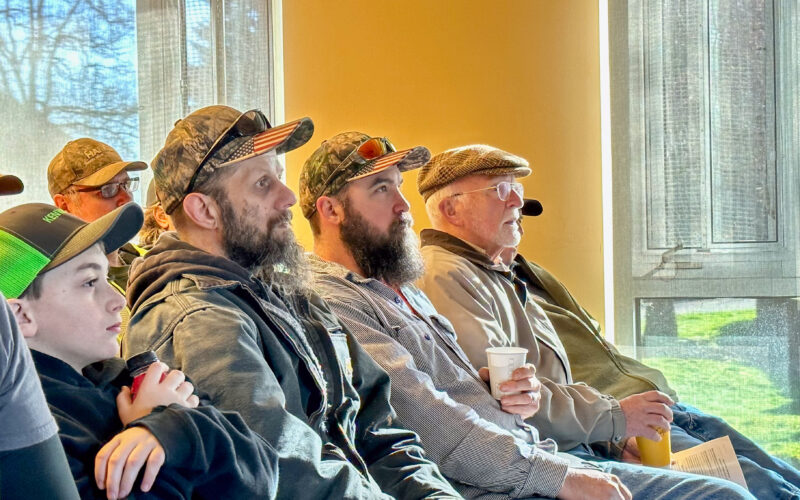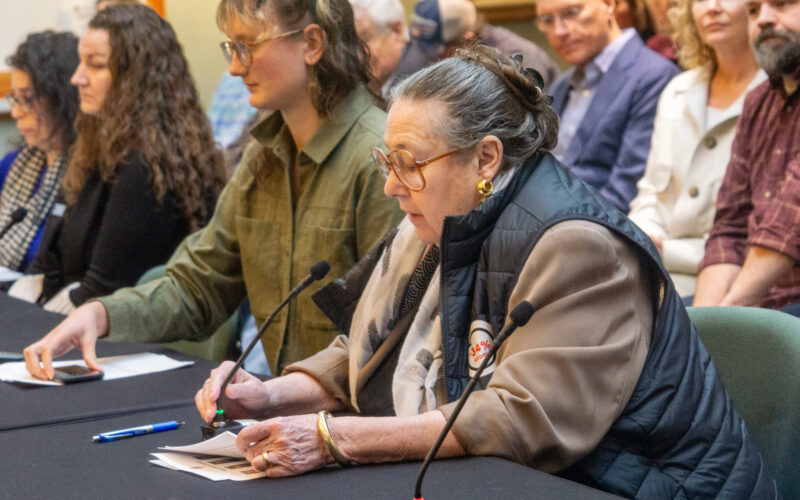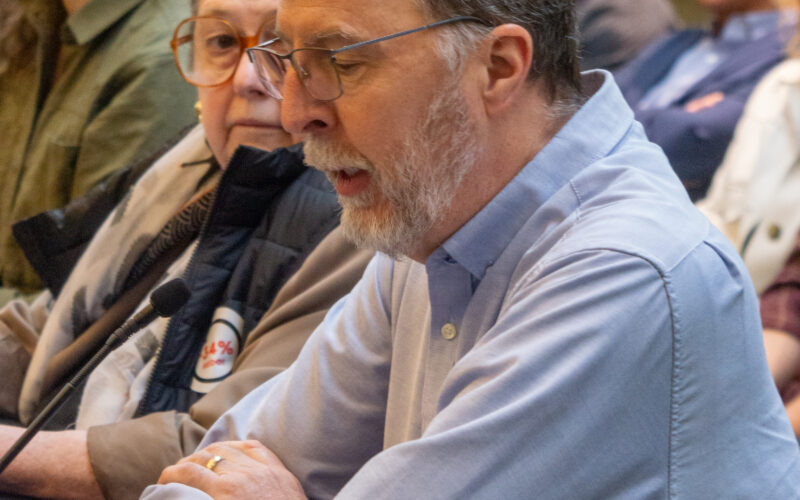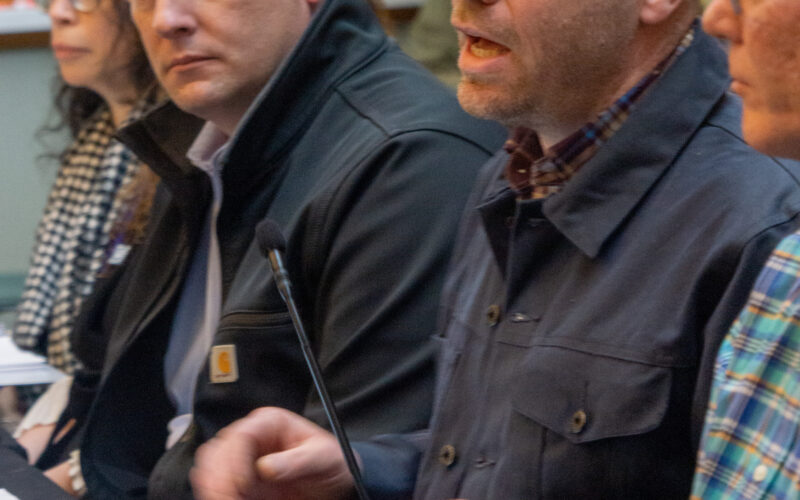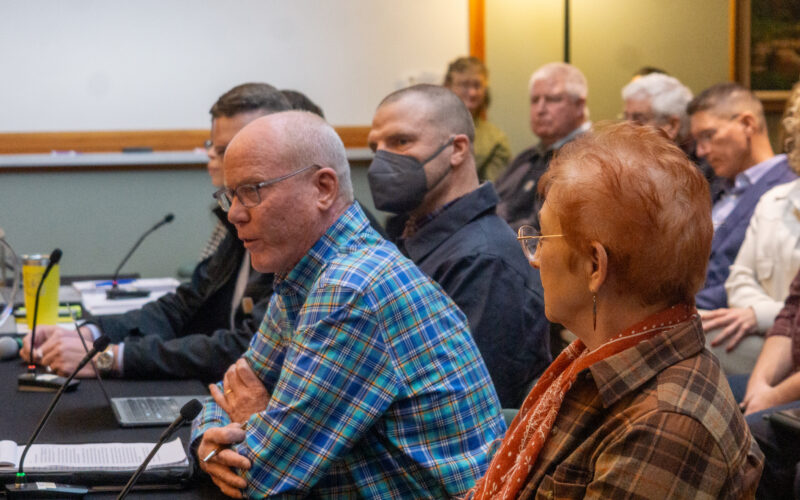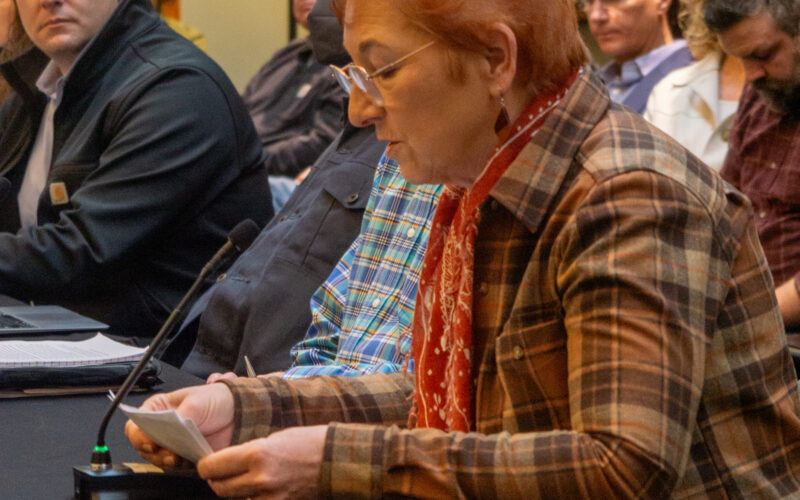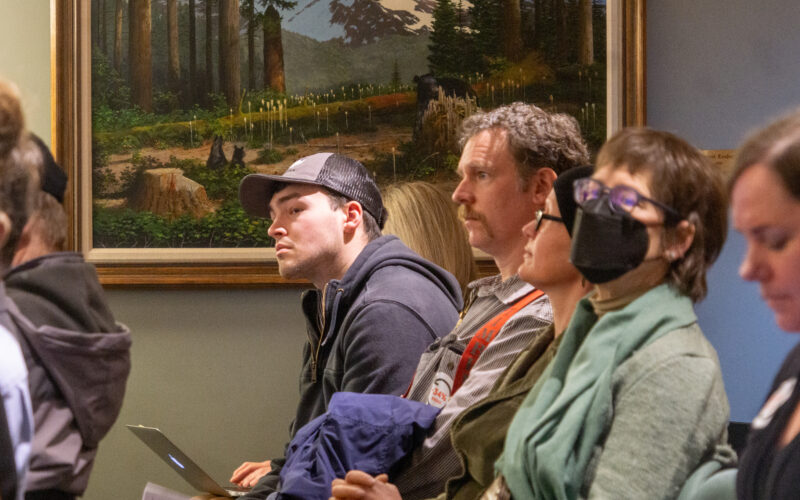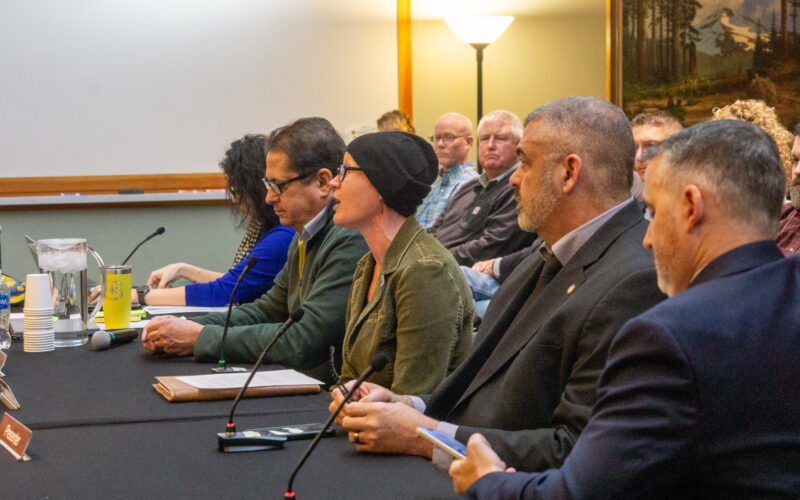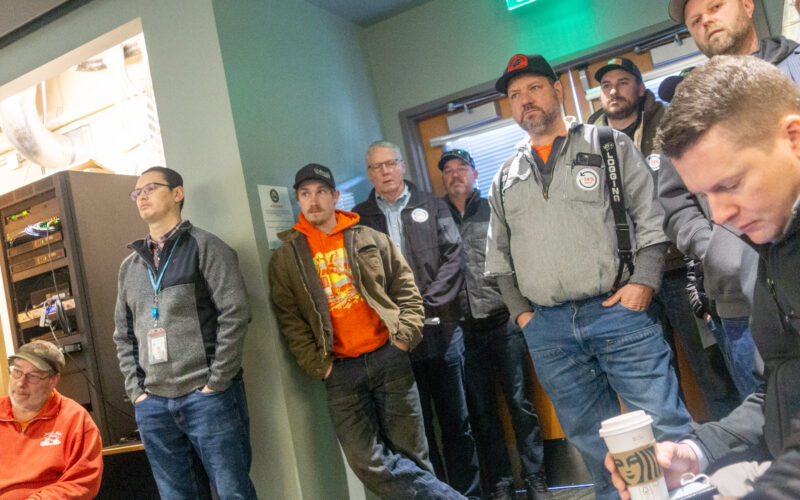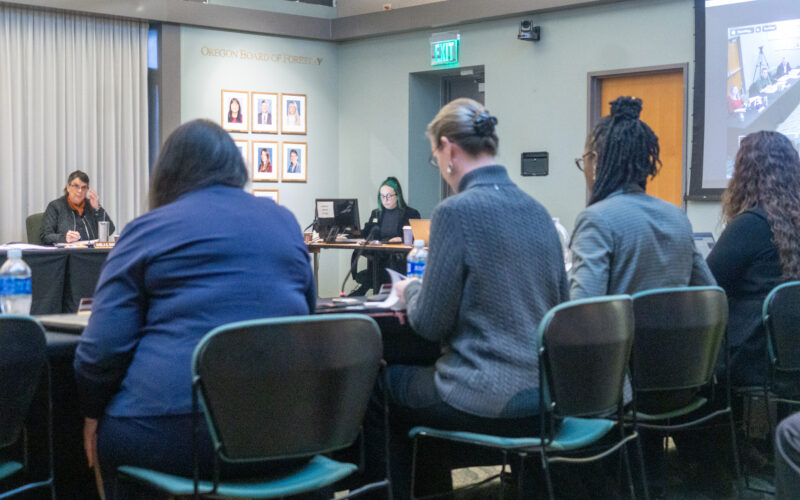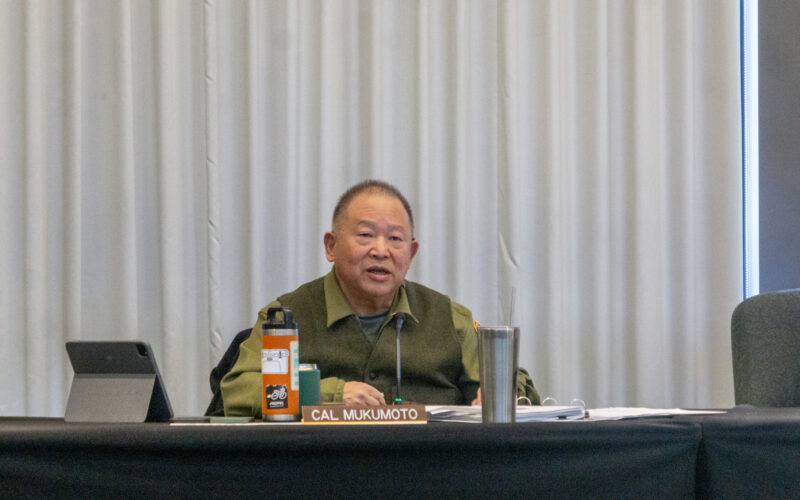Amidst a backdrop of protests and heated debate, the Oregon Department of Forestry Board (ODF) made a divisive decision on Thursday, March 7, voting 4-3 to advance a contentious proposal aimed at curbing logging across 640,000 acres of state forests while prioritizing the protection of endangered wildlife.
The Habitat Conservation Plan (HCP) seeks to align western Oregon’s forests with the federal Endangered Species Act, safeguarding habitats crucial for at least 17 imperiled species. However, the plan also involves reducing timber harvests on state forests, which could lead to diminished revenue for local county services and a decline in employment opportunities in rural areas already grappling with economic challenges.
It was a day of betrayals and high injustices to the loggers who lined the streets of Salem in protest of the decision that would, in their eyes, seal their fate. Despite fervent appeals from the public and unsuccessful attempts to postpone the decision through three separate motions, the board forged ahead with its vote.
A move former gubernatorial candidate Betsy Johnson predicted. Johnson vehemently criticized the ODF’s impending decision, labeling it a “catastrophic mistake based on a flawed process.”
“The forest accords were supposed to be an agreement… about how logging was going to be conducted. This is coming back and grabbing more timber,” Johnson asserted.
Johnson particularly took issue with the board’s perceived lack of concern and dismissiveness towards dissenting voices
“The state forester is recommending the most radical approach,” she said. “He could have dialed it back 100,000 acres, this is going to have long term negative ramifications on the state of Oregon.”
“The most insulting part is that [a few] people are deciding timber policy in the state of Oregon. What happened to the votes and things like that?”
Johnson highlighted the disregard for public feedback, stating, “They listened to 800 people and incorporated nearly none of the recommendations from the people that spoke against this.”
Despite the possibility of changes, Johnson expressed skepticism, suggesting that the decision had been predetermined.
“Do you expect that there will be any changes? Do you think they’re gonna ram this through today? “Johnson asked, responding to her own question. “The decision was made ages ago,” she said.
Johnson criticized the lack of consideration for the human cost of forestry decisions, calling for accountability and empathy.
“They should [be ashamed]…They’re very anti-human,” Johnson said, stating further her frustrations.
In the final vote, Board Chair Jim Kelly, Ben Deumling, Chandra Ferrari, and Brenda McComb all voted in favor of approving the Habitat Conservation Plan. Joe Justice, Karla Chambers, and Liz Agpaoa voted against it.
Leading up to the final vote, Justice, Chambers, and Agpaoa each put forward motions that would have delayed the approval. The motions called for additional study or finding ways to increase the harvest level, but all three failed along the same lines.
Regarding the vote, Tasha Web, of Sweet Home and secretary for the board, for Oregon Natural Resource Industries (ONRI) said, “I’m a little broken today. And a lot exhausted. A lot rattled. I’ve put in everything humanly possible to help protect our natural resource industries for five years, every day. That’s all I’ve done for five years. And today was a monumental loss.”
Web said, “Our team has done everything thinkable and beyond to get word out on the HCP. To educate. To fight it. To get every elected person we could, to stand against it. But to keep taking loss after loss after loss after loss. To see farmers’ tears and loggers’ tears and miners’ tears. To watch people sell off and leave and give up and close down and give up and give up and give up….I’m just a little broken today”
ONRI, who organized the protest, advocates for the livelihoods of working individuals and families reliant on natural resource sectors such as forestry, logging, ranching, trucking, mining, fishing, and farming. This encompasses both rural and urban communities.
Web wasn’t just making statements when she spoke of folks packing up and leaving town over the restrictions loggers are continually finding themselves faced with.
McKenzie Dukes, who drove from Idaho to join the protest, stated, “I came from Idaho to stand with ONRI today. I wish Oregon would change, so that one day my wife and I could return to the state we love, that we were forced out of due to the tyranny.”
Continuing he said, “Oregon has to stop with this one way environmentalist, extreme left, liberal ruling of their constituents. The Legislature is not in the best interest of the people. They do not allow people to vote on important issues. They do not care what the people think, and they often think it is best that they decide the vote.”
Dukes said by the ODF deciding the fate of loggers it took the vote and the voice from the people. He said, “This is not how a constitutional republic is meant to be governed. The legislature votes against what their constituents want and they pass laws that are unconstitutional.”
“They pass regulations and laws that destroy the very things that make Oregon great. They take hard working rural Oregonians’ livelihoods away, their hobbies and generational businesses, to cater to extreme environmental and special interest groups with all of their actions ending in catastrophic destruction of state natural resources and jobs.”
Expressing his disappointment in the board’s decision to move the HCP forward for federal review, Dukes said, “No more tyranny in Oregon.Restore the people’s voice and their vote. Bring back the powerhouse of Oregon Natural Resources and restore Oregon to the most beautiful and prosperous state in the Pacific northwest! We The People have the power. The power is in numbers. Come together for Oregon and Fight back!”
The proposed plan would scale back logging operations to an estimated 185 million board feet of timber on western Oregon state forests, a decrease from the approximately 225 million board feet harvested over the past decade.
Numerous members of the public were on hand to express concerns about the potential economic repercussions, fearing further closures of sawmills and job losses while those whose lives hinged on the board’s decision overflowed the meeting room into a standing room only side room where they stood watching as their fate unfolded.
Board members, who have deliberated over the plan for years, grappled with the implications of their decision. Ben Deumling, who manages Zena Forest in the Willamette Valley and voted in favor of the HCP, acknowledged the gravity of the action, lamenting the absence of a preferable alternative.
Chair Jim Kelly, also supporting the HCP, underscored the board’s obligation to abide by the Endangered Species Act, recognizing the legitimacy of arguments from both sides while emphasizing the necessity of considering the broader implications.
The meeting commenced with Oregon State Forester Cal Mukumoto, head of the Oregon Department of Forestry, advocating for the board’s endorsement of the HCP. Mukumoto highlighted the plan’s significance in providing a more stable operational environment, devoid of legal entanglements and lawsuits.
Previous to the vote, Governor Tina Kotek addressed the Board in a letter dated Mar. 5, 2024, acknowledging the complexity of the decision-making process and commending the Board members for their dedication. She wrote, “This is certainly a difficult week for each of you serving on the Board as you decide whether the State Forester should finalize and submit the proposed HCP for Oregon’s westside forests.”
Kotek’s letter highlighted ongoing efforts to address the fiscal impact on Trust Land Counties resulting from reduced harvest levels anticipated under the HCP. She assured the Board of her commitment to finding solutions, stating, “I see a viable pathway forward to address the estimated reduction in timber receipts that would result from implementing the anticipated HCP.”
Additionally, on the same day, the Oregon Senate and House Republican Caucuses jointly addressed Governor Tina Kotek, urging immediate reconsideration of the ODF’s proposed HCP. The 70-year logging scale-back, as described by the caucus, has already shown adverse effects on businesses, with heightened concerns following the recent closure of several sawmills.
The caucus expressed significant reservations about the current iteration of the HCP, emphasizing its lack of balance between economic interests, environmental conservation, and societal benefits for Oregonians. In their letter to Governor Kotek, they emphasized the necessity of ensuring that forests remain valuable resources for communities, advocating against measures that they foresee as imposing long-term negative impacts.
In their words, “This 70-year forest policy does not support a balance between economic, environmental, and social benefits to all Oregonians.” They underscored their opposition to measures they perceive as “burdensome HCP measures that will knowingly have negative impacts on our communities for the next several decades.”
Pointing to recent projections released on Dec. 13, 2023, the caucus highlighted a substantial increase in conservation acres and a significant decrease in timber harvest levels compared to previous promises. ODF had initially advertised the HCP with an annual harvest certainty of about 250 mmbf (million board feet), but the latest projections indicate a decline between 168-185 mmbf annually, signaling a heavy emphasis on conservation at the expense of economic viability.
As per the press release, “ODF advertised this HCP as a conservation plan with harvest certainty of about 250 mmbf (board feet) annually…Obviously, this 70-year plan is heavy on conservation and light on economic viability which is not in alignment with Greatest Permanent Value.”
Additionally, the caucus drew attention to the discrepancy between the HCP and the principles of “Greatest Permanent Value,” citing statistics that demonstrate the historical timber harvest levels and the revenue generated by ODF. They noted that while ODF had exceeded conservation requirements by adding approximately 100,000 acres, the HCP did not fully account for critical habitats such as those of the Marbled Murrelet, Red Tree Vole, or Coho Salmon.
In their argument against the HCP, the caucus referenced scientific perspectives, including findings from the Intergovernmental Panel on Climate Change (IPCC), which recognize managed forests as significant contributors to climate mitigation. They stressed the potential benefits of sustainable forest management, including the production of renewable wood products vital for addressing issues such as homelessness, affordable housing, and forest fires.
“The HCP will exacerbate these issues,” they warned, advocating for “proper and sustainable management” of forests as an alternative solution.
They urged the Board to reject the State Forester’s recommendation and instead directed ODF to substantially amend the HCP to improve harvest and economic outcomes to no avail. The decision of the ODF will undoubtedly have far-reaching implications for the future of these forests and the communities that rely on them.





